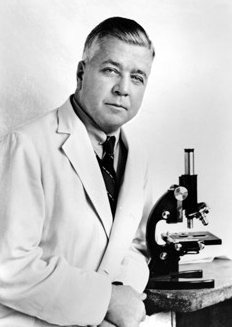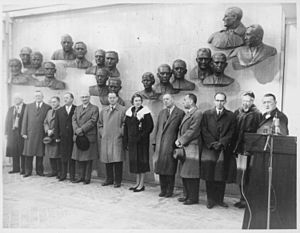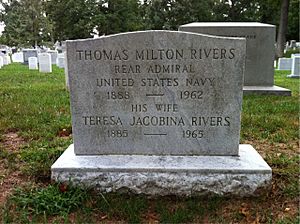Thomas Milton Rivers facts for kids
Quick facts for kids
Thomas Milton Rivers
|
|
|---|---|

Thomas M. Rivers
|
|
| Born | September 3, 1888 Jonesboro, Georgia, U.S.
|
| Died | May 12, 1962 (aged 73) Forest Hills, New York, U.S.
|
| Nationality | American |
| Alma mater | Johns Hopkins University Emory College |
| Known for | first description of the Haemophilus parainfluenzae |
| Scientific career | |
| Fields | virology |
| Institutions | Rockefeller Institute |
Thomas Milton Rivers (September 3, 1888 – May 12, 1962) was an important American scientist. He studied tiny living things like bacteria and viruses. Many people call him the "father of modern virology" because of his big discoveries about viruses.
Contents
Early Life and Education
Thomas Rivers was born in Jonesboro, Georgia, in 1888. He went to Emory College and earned his degree in 1909. After that, he started medical school at Johns Hopkins University.
During his studies, he faced a challenge. He was diagnosed with a muscle problem that made him leave medical school for a while. He worked as a lab assistant in Panama. But his illness did not get worse, so he bravely returned to Johns Hopkins. He graduated as a doctor in 1915.
A Career in Science
In 1922, Thomas Rivers began working at the Rockefeller Institute for Medical Research. He led the part of the institute that studied infectious diseases. Later, in 1937, he became the director of the entire institute.
Rivers' work in the 1930s and 1940s helped the Rockefeller Institute become a world leader. It was known for its amazing research on viruses. Even after he retired in 1956, he kept helping the Rockefeller Foundation.
Fighting Polio
One of Rivers' most important roles was helping to fight polio. Polio was a terrible disease that could make people unable to move. He was in charge of committees for the March of Dimes. This group worked to find a cure for polio.
Rivers oversaw the testing of Jonas Salk's polio vaccine. This vaccine was a huge step in stopping the disease. His leadership helped make sure the vaccine was safe and worked well.
Military Service
Thomas Rivers also served his country. He was part of the armed forces medical corps during both World War I and World War II. During World War II, he led a special Navy medical research team. This team worked in the South Pacific. He rose to the rank of rear admiral in the Navy.
Later Life and Legacy
In 1948, Rivers edited an important book about viral infections. This book became a standard guide for scientists.
In 1958, he was honored for his work against polio. He was inducted into the Polio Hall of Fame in Warm Springs, Georgia.
Thomas Rivers was married to Teresa Jacobina Riefle. He passed away in New York in 1962. Because of his high military rank, he was buried at Arlington National Cemetery.
 | Emma Amos |
 | Edward Mitchell Bannister |
 | Larry D. Alexander |
 | Ernie Barnes |



